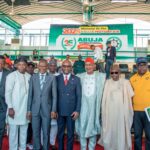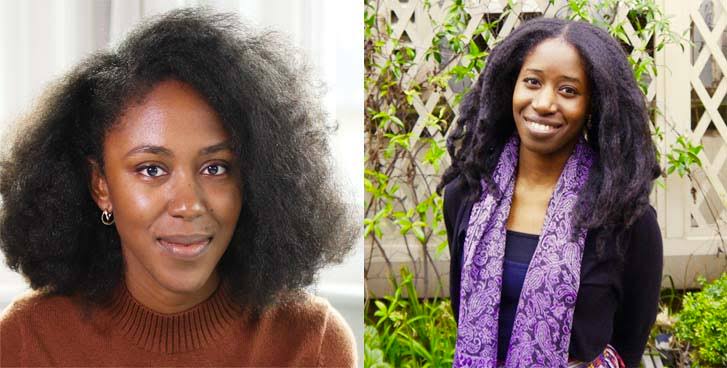–Natasha (Left) Adukwei Bulley (Right)
*A discussion about exhaustion, refusal and the beginner’s mindset
Natasha Brown and Victoria Adukwei Bulley wrote to one another in the summer of 2021.
They discussed the importance of acknowledging exhaustion, the power of refusal and the photography of Carrie Mae Weems. Natasha Brown is a novelist who spent a decade working in financial services, after studying Maths at Cambridge University -her debut, Assembly, came out in June. Victoria Adukwei Bulley is a poet and writer, working on her debut poetry collection and a novel.
Natasha Brown is a novelist who spent a decade working in financial services, after studying Maths at Cambridge University – her debut, Assembly, came out in June. Victoria Adukwei Bulley is a poet and writer, working on her debut poetry collection and a novel.
————————————————————
Victoria Adukwei Bulley:
We’ve not met, and so we are strangers of a kind, but I do think there is a way in which writers meet each other through their work, and there’s a kind of beauty in that. Before we get to speaking about the work, I wanted to ask how this past year has been for you, what the view is like from where you are – be that literally from your window, or figuratively – and what’s something that’s caught your attention lately?
Natasha Brown:
It’s hard to say how I’ve found the past year – I think I’ve adapted to this new normal. What strikes me about my view, from here, is how it filters in through two channels.
There’s the physical reality of home, and my bubble (‘bubble’ – isn’t it strange how quickly our language adapted, too?). And then, there’s virtually everything else: friendship, politics, world events. All mostly experienced via the internet now, on monitors and phone screens. I guess this split predates lockdown life. But the two views seem harder to reconcile into a cohesive reality, these days. Carrie Mae Weems’s Kitchen Table Series has been on my mind recently. When I first encountered it, I was intrigued by the narrative threaded along the twenty photographs; how a domestic space transformed with the people passing through it. Today, leafing through the book of the series, it’s the images of Weems alone that stand out. They seem to resonate with a new relevance, contextualised by last year’s isolation. I had a sense of knowing through experiencing a work. How have you found this time? And have you felt compelled, as I have, to revisit the familiar?
Adukwei Bulley:
It’s as though everything has shrunk just as much as it has expanded. Some of this has been strangely enriching. With so many talks and discussions taking place online I’ve been able to ‘attend’ things in a way that I might not otherwise have had the chance to – things that are happening abroad, for example. But despite all of that there’s also an ongoing feeling of life having been deferred; paused until later. As though in the meantime we’re collectively stuck in a waiting room, watching screens to pass the time, occasionally remembering that, no, this isn’t an interim, this is our lives now. That time hasn’t stopped and our lives haven’t been paused at all. That’s really sobering.
Your mention of Weems’ Kitchen Table Series takes me out of that dystopia a little, in that it reminds me of what’s liberating about good art. Like you say, Weems builds the sense that the spaces we inhabit are more fluid than fixed. You feel it when you notice how many of those images are spacious and freeing, while others feel claustrophobic. And yet it’s the same room. I think this also has a lot to do with how the light differs – some of the shots are more exposed, so they’re brighter – but nonetheless they tell us that space is elastic. That feels like something I’ve tried to keep hold of all along.
One of the things I really enjoyed about your novel, Assembly [which published in June with Hamish Hamilton] is its sparse interiority, the way the protagonist’s inner landscape shapes what we are reading. The novel is slight, physically, but it works because you do something with time that’s really fascinating, and that’s down to how her thoughts are so sharply articulated that they need little embellishment at all.
Here’s an example, a line that reads: ‘I will be watched, that’s the price of admission.’ Of course there are lines that follow this, that build on this, but for those who know the fatigue that comes with this knowledge, that naturalised ‘double consciousness’ as W. E. B. Du Bois puts it, this line is acute.
Brown:
On the blurb of the book jacket, it says: ‘The narrator of Assembly is a Black British woman.’ The presence of this sentence underscores one of the central questions that led me to start writing. Does ‘novel about a black millennial woman’ set up narrative and thematic expectations in the same way that ‘Disney princess movie’ or ‘Bildungsroman’ would? I wanted to examine how an identity (black, millennial, woman) is transformed into genre. And to explore how this conflation of identity with story has influenced our cultural narratives. To tackle this, it felt crucial to centre the narrator’s experience as she attempts to develop from a passive object, limited by narrative constraints, to an active voice – capable of her own commentary and analysis. What you describe as a naturalised ‘double consciousness’ rings so true; living within this double consciousness is now so natural that I found it difficult to defamiliarise the effect enough to reveal it. I adored how your poem ‘revision’ accomplished this, defamiliarising the erasure of colonialism by using a form that required me, as the reader, to participate in it actively.
Adukwei Bulley:
Going back to the start of things, what’s the story of how Assembly came to be? Am I right in thinking that you were working on the ideas behind the novel for a while, and then you won a London Writers’ Award, which gave you the space to develop it further?
Brown:
That’s right. There are thirty winners each year, it’s like a mini MFA. At the start of the London Writers’ Awards, I didn’t have much from the narrator’s point of view. My initial focus had been on fleshing out the secondary characters, understanding their motivations and arcs, before placing the narrator into their world. I felt a big responsibility to tell this story in the right way, and to treat the characters with empathy. I was also very interested in the idea of the neutrality of language, or really the idea that language isn’t all that neutral. But it’s a slippery problem – attempting to deconstruct a language, using that same language . . . without becoming too abstract.
Adukwei Bulley:
It’s really fascinating to hear you talk about how you started from the outside and worked your way in from the secondary characters. It’s a novel where the protagonist is very much at the edge of the world that they are in, and so there’s not a lot of speech. Where there is speech, it’s usually not from the protagonist, it’s other people speaking, while the protagonist hears and responds via an internal dialogue with herself.
That structure works because this is a book depicting the lived experience of a person who is in the room, but also is kind of not there in the eyes of others. She’s privy to those uncomfortable witnessings, whilst simultaneously being aware of her own non-being within those spaces.
Nonetheless, towards the end a standpoint is reached. There is a ‘coming into speech’ that’s happening.
Brown:
Yes, exactly – she starts off as an object, wholly restricted by her circumstances, and we watch her develop a voice. And even if that doesn’t – in what we see – lead to any grand action, I hope it highlights the importance of developing a critical voice.
Adukwei Bulley:
Another quote from the book stands out for me: ‘I’ve lived my life by the principle that when I face a problem I must work to find an action I can take to overcome it; or accommodate it; or forge a new path around it; excavate the ground beneath it, even. This is how I’ve been prepared.’ In the midst of the constant assault of the world on black life, this quote captures the frailty of having been schooled to relentlessly meet all of these affronts; to meet every small or large violence and to be the bigger person, or to be better read about it all, or to have the right responses for next time, to be smarter, twice or thrice or however many times as good. I deeply appreciated the space you made in this work for acknowledging exhaustion and the idea of quitting, to put it bluntly.
There have been many conversations
around refusal; with several writers and theorists I love engaging with it as a praxis. Though the novel does touch upon the suicidal impulse, it’s careful in that it reads less as an active wish to not be here anymore as oneself, and more about saying no to the terms of
the world and its impositions. It refuses
the dehumanising grand narrative of
being endlessly able to accommodate
and rise up and overcome.
Brown:
There is that sense of exhaustion and the line you pulled out is key to it. The sheer amount of violence and hatred and aggression that previous generations faced presented a slightly different set of challenges, compared to now. I think the assault has become more sophisticated, and more entrenched. So, one challenge today, I think, is deciding how to adapt the lessons learned from previous generations: getting along despite everything,
working hard, and quietly progressing forward. With this novel, I wanted to really dive in and ask how does that feel on the individual level? I knew I didn’t want to embrace a destruction
narrative and have the narrator tear her whole life apart. Realistically, I don’t know anyone who’s done that. Instead, I wanted to explore the cumulative effect of these pressures in a way that hopefully resonates, or at least asks questions about what this experience is like. I don’t think there are easy answers.
Adukwei Bulley:
I’ve also just remembered that line was from one of the protagonist’s friends also a colleague who says ‘It’s like being a woman isn’t enough anymore.’ This in the context of another of the protagonists’ co-workers going on a tirade against affirmative action and hiring quotas. I wondered if you could expand on that on what’s encapsulated in that, and what kind of experiences have fed into that for you.
Brown:
As a black woman, I think you can become a lightning rod for all kinds of opinions quite raw and even ugly emotions, sometimes. It’s rarely a response to you as an individual, I think. But I was interested in capturing the sort of language used to express these opinions. I think it can be helpful to document, with a sort of detached precision, the nature of some of these interactions.
Source: Granta (online) June 11, 2021.











